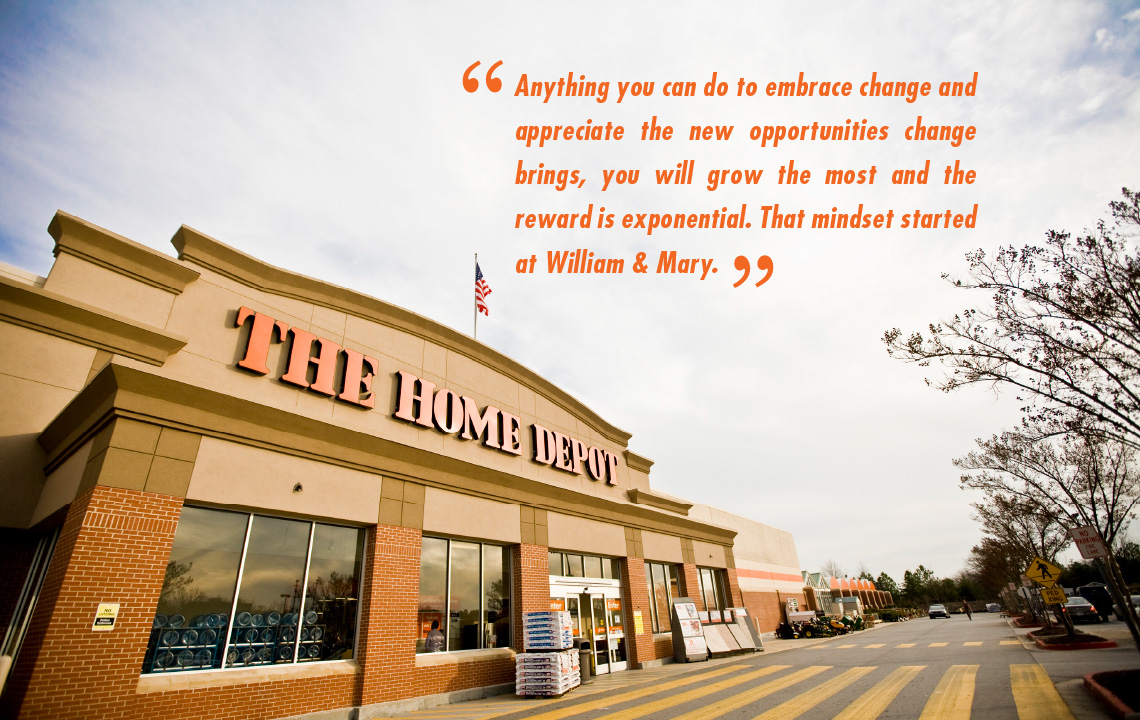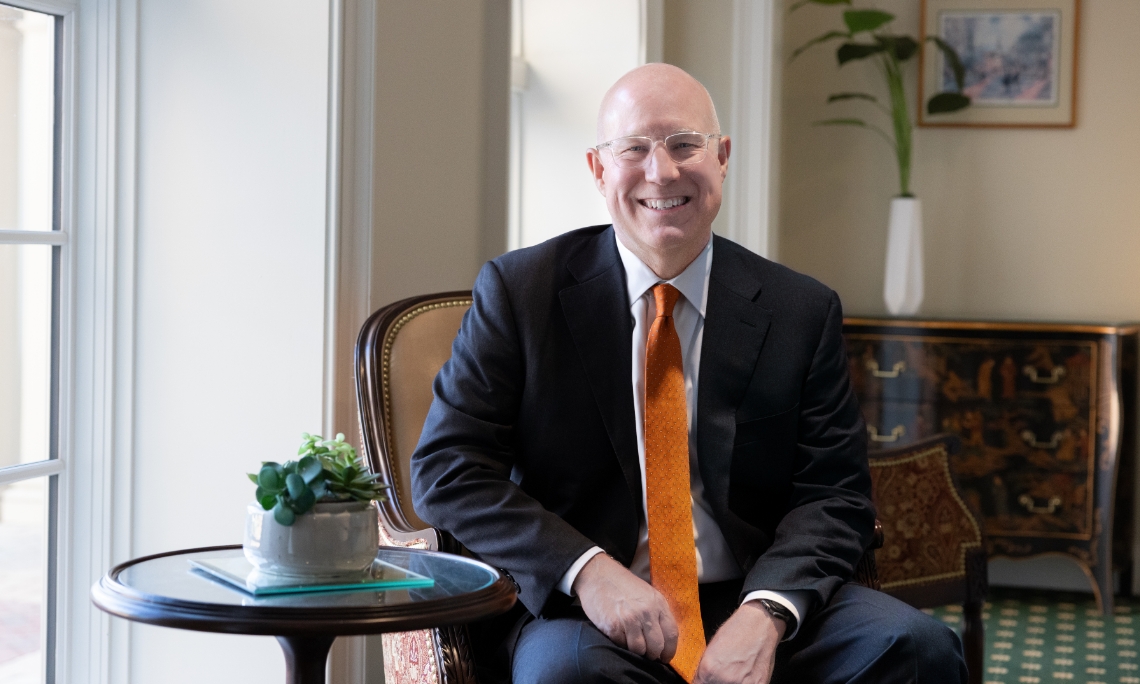‘SPIRIT AND LIVELIHOOD’
Photos of Decker show him in the iconic orange Home Depot apron, in the store ready to get his hands dirty. Speaking with him, he’s an easygoing guy, warm and casual, with a self-effacing sense of humor, who gives the impression that he’s genuinely interested in the people around him.
To Decker, servant leadership starts with creating an open and engaging environment so that everyone feels they are part of the team and their ideas are welcome and expected. It also means recognizing good work when he sees it. As he talks, he consistently praises others, whether he’s discussing leaders he’s worked with, associates on the sales floor or even people he doesn’t know who have skills he admires.
He says the first thing he and his leadership team ask store managers when they visit stores is, “Who would you like to recognize with a Homer Award?” — Home Depot’s award for providing excellent customer service and showing the company’s values. Those values are intentionally incorporated into every training and communication to “maintain their spirit and livelihood,” Decker says, but he also believes they are inherent.
“I’m a firm believer that every person in every situation inherently knows the right thing — whether we act on it or not,” he says. He feels the pressure of that, too: “If you make a decision that’s against your values, it’s easily seen and you lose a lot of credibility.”
Stephanie Coleman Linnartz M.B.A. ’97, CEO and president of Under Armour, serves on the board of The Home Depot and its audit and leadership development committees. “She’s literally my boss,” says Decker with a smile. “To have a kindred spirit who ‘gets’ William & Mary on the board is so cool and an absolute blessing.”
During the pandemic, when Home Depot was experiencing record sales and Marriott’s hotels were struggling due to travel restrictions, Decker and Linnartz — who was at that time president of Marriott International — worked together to create a jobs portal so that Marriott associates who had been laid off could find employment in Home Depot stores.
Decker and Linnartz spoke about leadership with W&M business and law students in September 2023 as McGlothlin Fellows for the McGlothlin Leadership Forum (see sidebar below the article).
“Being on the Home Depot board has been a great honor and tremendous learning opportunity. I have enjoyed working with and learning from Ted,” says Linnartz. “I have been especially impressed with Ted’s commitment to Home Depot’s diversity, equity and inclusion efforts and the intentional way he executes against them.”
For Decker, “doing the right thing” also includes sustainability, such as recent efforts that have reduced the carbon footprint of stores by 50%. It also includes giving of your time, and he cites the more than 1.5 million hours associates have volunteered through Team Depot projects in communities nationwide since 2011. The Home Depot Foundation has invested more than $500 million in veterans causes and improved more than 60,000 veterans’ homes. They also partnered with the Lewis B. Puller, Jr. Veterans Benefits Clinic at William & Mary Law School.
According to Decker, The Home Depot was the only nongovernment entity at Ground Zero right after the 9/11 attack on the World Trade Center, providing generators, bottled water and supplies to first responders.
“We regularly do this for hurricanes and other disasters — we send hundreds of trucks and give it all away,” says Decker. “We probably need to be better at telling people about the good work we are doing, but we don’t do it for the publicity. There are companies out there that show up one time and build Super Bowl ads off that. That’s not us. We do it because it’s the right thing to do.”
He calls Home Depot’s previous CEO, Craig Menear, a “North Star” of doing the right thing during the COVID-19 pandemic. Decker was in the 4 p.m. daily calls with Menear and senior leaders, adjusting strategy every day. In 2020, the Centers for Disease Control and Prevention was limiting essential stores — including Home Depot — to a certain number of people per square foot. For many stores, that was about 500 customers and associates. Menear, however, felt the right thing to do was limit it even further, to just 100 people per store, and the information technology team created an app to allow associates to track numbers on all entrances to enforce this.
“We knew we would lose relative share, but it was the right thing to do. It instilled trust,” says Decker.
The Home Depot grew during the pandemic by $47 billion, which is 43% — rapid growth despite limited numbers of customers and associates in stores, supply chain shortages, and additional expenses for personal protective equipment and cleaning. It was fueled by a home improvement boom as Americans spent more time at home and used money that typically went toward going out on improving their living spaces.
High home prices also may have motivated some homeowners to renovate in order to sell their property or to update instead of buying something new. U.S. spending on home improvement jumped to $497.1 billion in 2020, an increase of $90.5 billion in just one year; in the previous 10 years, it had risen an average of just $15.2 billion per year.
Decker took the reins in 2022 and is now overseeing Home Depot in its first post-pandemic quarters of decreased sales, with the first quarter of 2023 seeing a 4.5% comparative reduction over the first quarter of 2022 and the second quarter showing a 2% reduction. He says he is not concerned, though, and that this is expected “moderation” on the part of homeowners as they switch their spending back to services from goods.
“As we learned through COVID, we have to be agile. Everyone has a plan until they get punched in the mouth. We are constantly updating forecasts — yearly, quarterly, monthly, weekly — to respond in real time,” he says.
He sees the housing shortage as an area of opportunity for the business — not only because meeting demand will require significant construction, but also because rising home values are adding to the equity wealth for American homeowners, to the tune of $15 trillion since 2019.
The Home Depot Foundation is planning to invest $50 million by 2030 in training skilled tradespeople through its Path to Pro program. Decker calls a lack of skilled labor a major reason for the housing shortage. He emphasizes that four-year college degrees are not the only path to wealth creation and career advancement, and he hopes state and federal governments will “put as much effort into those career tracks as into four-year degrees.”
The Home Depot’s “Pro” account holders — mostly professional contractors — make up about 10% of Home Depot’s customer base and 50% of sales, according to a Jan. 5, 2023, news release, so increasing the number of skilled tradespeople is also good for the bottom line.
Decker also sees Home Depot as relevant to the next generations of homeowners. Back in 2015, Home Depot assembled a cohort of interns from many different majors and disciplines. Their task: Explore the question, “Is home improvement and the classic American dream of home ownership still relevant to millennials?”
What they found was that yes, despite the Great Recession delaying some members of their generation from finding the jobs they wanted in the locations they wanted, they still aspired to own and improve their homes.
“The good news from that study was that absolutely, home and hearth matter,” says Decker.
The Home Improvement Research Institute found in 2023 that 49% of millennials complete five or more home improvement projects a year, the most of any generation. Millennials and Gen X are most likely of any generational group to choose DIY (“do it yourself”) methods, even as they express less confidence in their skills than older generations — which might lead them to a place like Home Depot for advice, a free class or a tool rental.
Whatever the future brings to the market, Decker feels ready for it. He advises students to be prepared to take on any new challenge, and he’s impressed by people who can jump into new and different projects with ease.
“Anything you can do to embrace change and appreciate the new opportunities change brings, you will grow the most and the reward is exponential,” he says. “That mindset started at William & Mary.”


